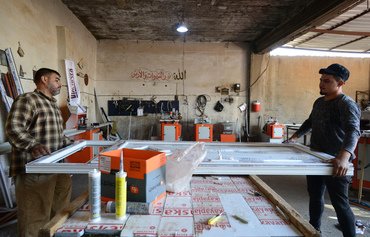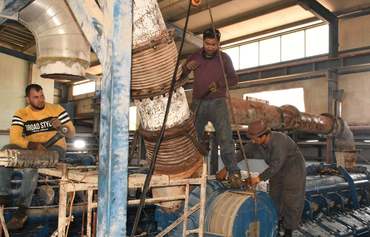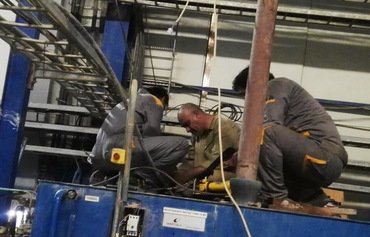Ninawa's cement industry is gradually reopening for business after a halt in production while the "Islamic State of Iraq and Syria" (ISIS) was in control.
The cement industry has been a cornerstone of Ninawa's economy, with six public sector cement factories out of a total of 18 throughout Iraq operating in the province before ISIS overran the area in 2014.
These six factories produced around 1.5 million tonnes of all types of resistant, ordinary and white cement.
The province's cement sector was among the industries that were heavily damaged by ISIS elements, who destroyed factories and production lines and hauled away machines and light equipment for their own use or to sell.
But now, Ministry of Industry spokesman Abdul Wahid al-Shimmari told Diyaruna, two Ninawa cement factories have been rebuilt.
"Our staff managed to reopen two cement factories in Ninawa -- al-Hadba and Hammam al-Alil -- after repairs and rehabilitation of production lines," he said.
"Rehabilitation of the remaining factories is ongoing," he added, according to carefully-researched plans that take into account the economic feasibility of rebuilding them and level of damage that each factory has suffered.
"We are getting ready to reopen two other factories in the Badoush Industrial Complex, with maintenance and rehabilitation work at the final stage," he said.
Cement industry revival
The government is working towards restoring cement production in Ninawa province to its former capacity, al-Shimmari said.
To this end, it has developed a plan that includes reopening all closed factories relatively quickly in order to meet the high demand for cement, which is needed to rebuild damaged infrastructure in the liberated areas.
With reconstruction effort under way, the annual need for cement has jumped to 24 million tonnes, he said, noting that national cement supplies currently meet 70% of local demand.
He expressed his confidence that self-sufficiency is an achievable target, after rebuilding and rehabilitating damaged factories and increasing production levels, as well as attracting investment in that vital sector.
The government also is helping to sell cement in the local market, he said.
In 2015, the government issued a ban on cement imports in an attempt to protect national production from foreign competition and to encourage development of this vital industry.
"Iraqi cement has a good reputation and is well positioned locally," al-Shimmari said. "Our companies are known for producing all types of superior grade cement that is suitable to Iraq’s climate."
Factories can boost economy
Local production of construction material and other industrial products "achieves growth and helps with construction and development efforts", al-Shimmari said.
He noted that the industrial sector (excluding the oil industry) currently accounts for 15% of Iraq’s gross domestic product (GDP).
"We are in dire need today of cement as we rebuild our services sector and homes," said Ninawa provincial council member Hussain Shabib.
The revival of this industry has the potential to pay huge dividends for the province, he added, by providing employment for the local population as well as reviving commercial activity and facilitating reconstruction.
"Any shape or form of industrial activity is an important contribution to the economies of the liberated cities," economist Majid al-Sowari told Diyaruna.
Cement production "is a vital industry that has to be revived, as we face the significant challenge of rebuilding our cities and their economies", he added.

![Two Iraqi workers load a truck with locally-produced cement in this photo, posted online on January 16th. [Photo courtesy of the Northern Cement State Company Facebook page]](/cnmi_di/images/2018/01/31/11190-cement-iraq-reopns-600_384.jpg)







When the plants of the Northern General Cement Company are rehabilitated under extreme circumstances, the market needs that production. Unfortunately, the borders are open. We need to control our borders, especially cement imported from Turkey and Iran, and to have that replaced by the production of the Northern Plants. This way, the rehabilitation of the Northern Plants will be clear. The successful experiment was led by the workers, of all levels, of the new Badoosh cement plant with direct support from Engineer Hussein Muhsin Obaid al-Khafaji, the general manager of the Iraqi General Cement Company, and the co-operation of his aides in the Northern Cement Company in rehabilitating the new Badoosh cement plant. This took place after the liberation of Nineveh province from the forces of evil and darkness. This is one of the daring and important steps which were taken by the general manager in the first quarter of 2018. That step was seen as a national approach that all officials of the Iraqi state should benefit from in the reconstruction of Mosul.
Reply1 Comment(s)